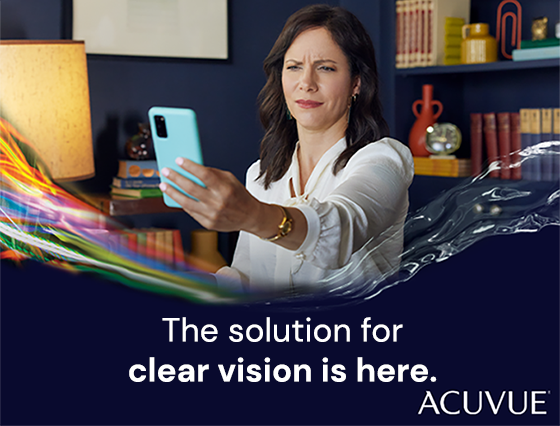How menopause affects your eyesight
Greek philosopher Heraclitus once said, "Change is the only constant in life." Whether it is your body, your career, or even your eyesight, at some point in life, it is a given that change will occur. For women, one of the most prominent periods of change often happens in their late 40s or 50s when menopause sets in. This naturally occurring hormonal transition has a wide range of symptoms that can cause issues and unexpected shifts both physically and mentally.
Let's take a look at some common experiences that woman may encounter during menopause and how they can potentially affect their lifestyle and vision.
What is menopause and perimenopause?
Before we get into menopause's effect on your eyes, let's first understand what it is. Menopause marks the end of a woman's reproductive years. This biological stage happens when a woman's menstruation cycle has not occurred for one year. This timeframe, which differs for each woman, is often signalled by a change in hormone levels and happens roughly around age 50.
The phase before this is called perimenopause and may gradually usher in some of the symptoms associated with menopause, like hot flushes, chills, and mood swings. Perimenopause lengths vary greatly and can even last up to 8 years – however, the average duration is usually around 3 to 4 years.
Does menopause affect your vision?
For many women, it will in some form. Since menopause impacts a multitude of bodily systems, it's not unusual for your eyes to also react to this shift in hormone levels. While each person's situation is unique, and some may not notice vision changes, many women regularly report experiencing these eye issues when undergoing perimenopause or menopause.

Common eye problems linked with menopause
Dry eyes
As one gets older, the production of tears naturally decreases, which can also be exacerbated by declining oestrogen and androgen levels. This hormonal decline leads to dry or irritated eyes due to a lack of lubrication formed by the tear film. Moisturising eye drops are the simplest and most straightforward treatment to ease dry eye symptoms caused during menopause.
Change in eye shape
As mentioned before, 'change' is the operative word when discussing menopause, and even though it might seem strange, your eye's shape might be affected too. A slight change in the cornea's elasticity and thickness may occur – impacting how contact lenses sit on your eye's surface. If you notice your lenses have become uncomfortable or your eyesight blurrier, schedule an appointment to discuss it with an eye care professional.
Light sensitivity
Also known as photophobia, this symptom often coincides with the proliferation of dry eye caused during perimenopause and menopause. Due to dryness, the eyes may be more susceptible to bright lights, resulting in squinting and even headaches in more serious cases.
Cataracts
Research has shown that menopausal women have a higher rate of developing cataracts than their male counterparts of the same age. While the formation of cataracts is mostly age and health-related (with increased risk to those who smoke or have diabetes), the reason for the disproportionate number of females who develop cataracts may be because of lowered oestrogen levels. Symptoms and signs of cataracts include cloudy eyes, blurred colours, impaired night vision and glare. Surgery is usually the treatment of choice to remedy cataracts.
Glaucoma
Tension on the optic nerve is the leading cause of glaucoma, and a menopausal shift in hormones may lead to a build-up in this intraocular pressure. Unfortunately, there is no cure for glaucoma, but when detected early, steps can be taken to reduce potential vision loss and nerve damage. The best way to determine if your eyes are experiencing the early stages of glaucoma is to have them checked regularly by scheduling an annual eye test.
Blepharitis
The same hormonal fluctuations that cause dry eye can also cause dry skin, and when this happens around the eyes, the inflammation is known as blepharitis. Itchy and swollen eyelids and flaky skin surrounding the eye are the most telltale symptoms of blepharitis. Luckily, this common eye condition can easily be mitigated with hot compresses and scrubs to keep the eyelids clean of debris.

How to take care of your eyes during menopause
Due to the various conditions your eyes may be susceptible to during peri/menopause, the number one precaution you can take to protect your vision is to schedule regular eye tests. Many causes of long-term eye issues and vision loss are preventable when caught in their preliminary stages. Since many symptoms are undetectable in these early stages by the average person, the help of an experienced eye care professional can determine if further treatment is needed.
To schedule an eye test or contact lens check, please visit our Book an Eye Test page to request an appointment.



